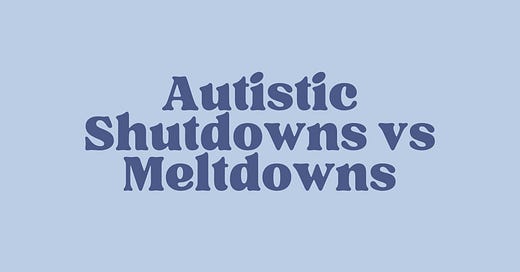Autistic Shutdowns vs. Meltdowns: Understanding Overwhelm
Autistic people can experience intense reactions to sensory overload, social demands, emotional stress and physical exertion. These reactions are commonly categorized as either shutdowns or meltdowns.
Both are responses to overwhelming situations and dysregulation, they manifest very differently.
NOTE: Not all autistic people experience both shutdowns and meltdowns. Some people may experience only one or the other, with others may experience both, but find one is more common or more frequent. Additionally, some people may experience one followed immediately by the other eg. a meltdown that leads into a shutdown.
What is a Shutdown?
A shutdown is often described as an internalised reaction, like a powering down that can shut one off from the world, making them appear somewhat unresponsive.
Shutdowns can involve:
Withdrawal: Becoming quiet, unresponsive, or retreating physically: curling up, hiding face, avoiding eye contact and touch.
Reduced communication: Difficulty speaking, inability to talk verbally or communicate in non-verbal ways.
Minimal movement: Becoming very still, rigid or slow to respond.
Internal processing: Being painfully and acutely aware of surroundings and/or being zoned out, feeling like you’re underwater or in a fog.
Think of shutdowns like a empty battery.
Just like an empty battery, energy is depleted and there’s nothing more left to give. Shutdowns are like an ‘energy saving mode’ that force rest, often in low stimulation environments, so we can recharge.
What is a Meltdown?
A meltdown is often described as externalised and outward reaction which can involve:
Verbal expressions: Crying, screaming, yelling, repetitive phrases and rapid disorganised speech.
Physical actions: Kicking, hitting, throwing, pacing and fidgeting.
Emotional intensity: Extreme feelings of frustration, anger, distress, panic and/or despair.
Loss of control: Feeling like you have no control over your own behaviour and being unable to stop it.
Black Outs: Some people don’t remember what they did or said during a meltdown.
Think of meltdowns like an explosion.
The system has become overloaded and is trying to release the pressure outward in order to move past overwhelm or stressors.
Ready to connect and share your experiences?
Navigating the world as an autistic individual can be incredibly rewarding, but it also comes with unique challenges. That's why having a supportive community is so valuable.
If you're looking for a place to connect with others who understand, share insights, and find solidarity, we warmly invite you to join an autism support group - they run every Monday!
Discover a space where your experiences are validated, and you can truly belong.







thnx chls !!! <3